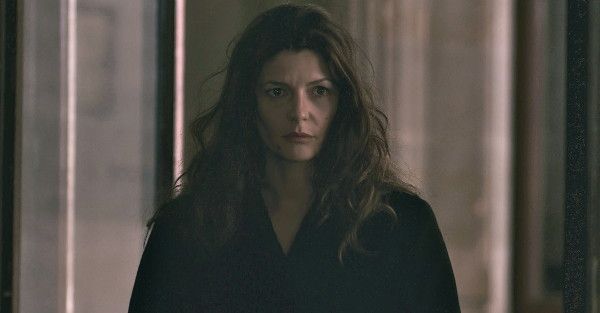 |
| Chiara Mastroianni as Raphaelle: "It's the real love scene." |
Claire Denis' sinister and irradiating Bastards (Les salauds), with superb performances by an impressive cast including Vincent Lindon, Chiara Mastroianni, and Lola Créton tells a story of corruption, vengeance, family, and hellish traces of unspeakable deeds.
During my conversation with Claire Denis we discussed the influence of Toshiro Mifune with Akira Kurasowa shoes, William Faulkner's Sanctuary, going in circles, Rip Van Winkle, and in-between places.
Anne-Katrin Titze: I am still in a slight shock after just watching Bastards (Les salauds). Your film moved me deeply.
Claire Denis: The film for me is a little bit like a shriek.
AKT: A shriek? A scream?
CD: A scream. Yeah.
AKT: The position of the women how you show them here is not often seen in cinema. The women are not merely victims. You show over and over again that not interfering when witnessing cruelty is a decision. Was the character of the sister [Sandra played by Julie Bataille] a starting point?
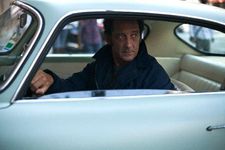 |
| Vincent Lindon as Marco: "The starting point was a man..." |
CD: The sister was not the starting point. The starting point was a man [Marco, played by Vincent Lindon], like a filmmaker in a way, whose job is to be protected from everyday problems. He is a sailor, he is traveling, of course he has a family because he has a solid job. He has the best life a man can have: he is rarely home, he is commanding a boat, it's tough but it's also a sort of honour. He has a good life. He can send money to his family. He is a good father. He has everything and suddenly the sister, without telling him exactly the truth, convinces him to come and help. I think, he doesn't know exactly, he thinks of course he will help in maybe a week's time. He doesn't understand what she is hiding. So from a sort of hero he becomes a victim. He is a hero in his mind. As a man he thinks "I'm coming".
AKT: Conquering the world on a boat is what he thought prepares him for being a hero?
CD: It's a great job if you think about it. It's not like being a pilot. On the sea you have an oil-tanker or whatever you have. You have time to live, time to think, time to be at the command. A lot of time to make decisions and to be responsible of the thing, you know. Which is a sort of life, that in my vision of a man's life, I think, would be one of the best. He doesn't have to deal with children after school, he doesn't have to deal with a water leak or things like that.
AKT: A mother [Raphaelle played by Chiara Mastroianni] picking up her son after school is one of the structuring devices of your film. These scenes were holding me emotionally.
CD: Yeah. And they are simple, no big deal about it.
AKT: Because of everything else, because their life is so un-simple, these scenes are necessary. Was that the idea?
CD: Yes. Yes.
AKT: The family's business is shoes. You show that factory, the rusty signboard, piles of cheap-looking shoes. There is a lot in shoes. Can you explain them in the context of Bastards?
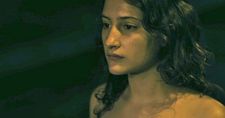 |
| Lola Créton as Justine: " I've never read a Faulkner character that is not fighting against odds." |
CD: This comes directly from an Akira Kurosawa movie [High And Low, 1963] made in the fifties where Toshiro Mifune is the hero actor. He became very rich from a very poor beginning. He was with his father repairing shoes and turns it into a factory of shoes. To make it even bigger he has to borrow money from his partners. They don't want to give him that money because they say the way he makes shoes is out of fashion. It's too expensive. The first scene of the film is Toshiro Mifune seated at a table with a white shoe of a woman with high heels. He is holding it and looking at it. The scene is great. It expressed so much - that a man is designing shoes for women, you know. This image for a long time has been in my mind.
AKT: The way you use them in your film gives different connotations. There are piles of unworn shoes. They are cheap shoes. You make a point of the quality of things. There are Lindon's character's beautiful expensive white shirts and beautiful torn T-shirts. And when he comes back from being at sea, the shoes produced in the factory have changed. Like Rip Van Winkle?
CD: Exactly. Coming back to another world.
AKT: Nothing is the same. What you said about the staircase [while we rode the elevator up to a conference room in the Rose building at Lincoln Center for our conversation], that is an in-between place.
CD: Like the lift.
AKT: I don't know exactly where I am going with this question…
CD: Don't mind me, I never know where I'm going.
AKT: The third time you show Raphaelle and Marco having their affair, they are in the staircase.
CD: It's the real love scene. The first one is almost an aggression. The second one she comes to him. And the third one, he realizes he is in love with her and he believes she is in love with him. He is not expecting this.
AKT: Children [and cats] like in-between places because they can put their mark on it. They can stamp it. They can say 'this is mine', doorways, corridors, places that don't belong to the adults. It fits them as a couple that has no room in the adult world.
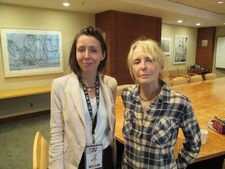 |
| Claire Denis told Anne-Katrin Titze: "Faulkner is not pessimistic. He is tragic." Photo: Ryan Werner |
CD: Maybe. Maybe unconsciously that's what I had in mind. For me this building and those apartments, I chose places really like tombs, horrible places. Coming to this apartment, getting undressed, it's dark - it's not a place he wants to stay.
AKT: It's a rich place.
CD: Not only rich. It's shadowy and not alive. It's morbid.
AKT: The morbid underbelly of that kind of established wealth I felt in the building. I had just spoken to [selection committee member] Amy Taubin. We were wondering about the child's bicycle you show in the forest. It confused us. Was there another child?
CD: Oh, it's about him [Marco]. At that moment he wants to get vengeance so he is dreaming that he could hurt her by kidnapping the kid.
AKT: So it's a dream because the bicycle is back intact afterward. It's his fantasy?
CD: He wants to make her suffer. Because her husband [Edouard played by Michel Subor] made his niece suffer. So as part of the attraction he is dreaming - maybe I could do that. Not knowing that the husband is going to take the son, you know.
AKT: The husband is terrific and terrifying. Michel Subor has this ghostly quality and he looks a bit like Pope Benedict with eyeliner. Interesting because the character represents a sinister, completely established evil. He remains unquestioned.
CD: Unquestioned. It's true. He says to her 'okay, you do what you want, but I keep my son.' He knows by doing that he is really destroying her.
AKT: He calls the son his "last seed". A great line. Your films often have strong connections to literature. Can you speak about those ties with Bastards?
CD: Yes. The first connection is about the vengeance. A guy who thinks he is strong and realises he is not strong comes from Akira Kurosawa, the film director. But I think the inevitability of the fate, the heaviness of the fate comes very clearly from William Faulkner. Therefore I used the sweet corn to mark it. [It is indeed a marker, as unforgettable in Bastards as it is in the rape in Faulkner's 1931 novel Sanctuary] There is something, not since I was a kid, but since I was 15 years old, in William Faulkner's despair and vision, because it's not only despair but also vision, when fate is showing its face. It's something not only I understand but I think life is like that. I was always amazed when I was 15 years old when I was reading that and I was told, oh, you should not, not really. For me he is a writer who has a reason in each sentence. He carried the weight of destiny. He knows that we are linked, completely linked with nature. Either it's flood or dryness. Everything I read in French or in English, I read everything actually, is in me now. I think I'm a Faulknerian.
AKT: Can you explain fate showing its face?
CD: It's the inevitability, the fact that you cannot… You can twist in a film and make a happy ending or whatever. But Faulkner would never do that. When the curse is starting, it's like a Mississippi flood. You cannot stop it, it's going.
AKT: And yet, I felt your film is optimistic. There is a way to stop the destruction.
CD: Of course. Faulkner is not pessimistic. He is tragic. Tragic doesn't mean no optimism at all. He understands the nature of human being is a tragedy and this is not pessimistic because in a tragedy there are a lot of good moments.
AKT: There is agency. You can do something and are not the passive victim.
CD: I think I've never read a Faulkner character that is not fighting against odds.
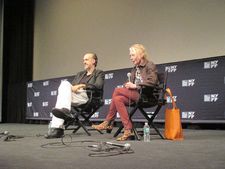 |
| New York Film Festival Bastards press conference with Kent Jones and Claire Denis Photo: Anne-Katrin Titze |
The following was my question at the New York Film Festival press conference with Kent Jones:
Anne-Katrin Titze: The decisions of destruction and of flight in this film seem to be constructed in circles. Can you talk about the structure?
Claire Denis: It was the job of installation, to start a new way of looking with Jean-Pol Fargeau, my collaborator [on the screenplay]. We progressed block by block. We don't know more than the main character Marco, more or less, except for the young girl [Justine, played by Lola Créton]. I don't know if it was a good idea, I don't know if it works, but it was step by step. Usually I like to go in a circle, very reassuring for me, back to the beginning, imagining flash forward, and things like that.
Sanctuary by William Faulkner ends in Paris, with the female protagonist looking out into the Luxembourg Gardens "… and on into the sky lying prone and vanquished in the embrace of the season of rain and death."
It is the season of Claire Denis' Bastards.





















